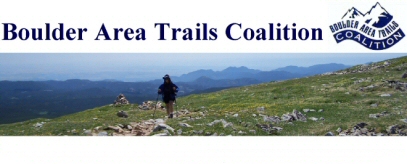

Homepage - Brochure - Application - Newsletters - Issues - Links - Weather - Board
Open Space: Our Common Ground
by Hildy Armour
BATCO, BCHA and FIDOS were among the sponsors of a public forum on the acquisition, management and use of public open space lands in Boulder County, on September 21, 2002 at the East Boulder Senior Center. Other sponsors included the Land Use Coalition (LUC), the International Mountain Bike Association (IMBA), Rock Shox, the Town of Superior, the City of Louisville Land Management Department, and several private citizens. More than 50 identified stakeholder groups, ranging from weed managers to bird watchers, were invited to participate in the forum. Approximately 175 members of the public, land managers, and media people attended. Refreshments were served.
Goals of the forum were defined as: 1) Identifying obstacles and problems to finding Common Ground, 2) Initiating a process for each of us to contribute to finding Common Ground, and 3) Discussing and listing solutions to finding our Common Ground.
Colorado Attorney General Ken Salazar, the keynote speaker, discussed the importance of land organizations in compensating for the failure of legislation to contain growth. He described Great Outdoors Colorado (GOCO), which uses lottery revenue to fund projects, as an example of successfully investing in the environment. He said more needs to be done to protect land and, especially, river corridors. He mentioned that at this time some public agencies, such as Jefferson County, emphasize diversified recreation as well as environmental preservation, whereas Boulder County seems to be emphasizing preservation over recreation. A recurring theme at the forum, Salazar stressed the importance of site specific management plans.
Ken Foelske, forum moderator, panelist, and Jefferson County Open Space Manager, discussed how open space is only one component of addressing growth problems. Each open space program is defined by its own charter, and can not be all things to all people. He sees open space enhancing "cyber youth", and acknowledged that lower income groups often see open space as blocking affordable housing.
Lawrence MacDonnell, City of Boulder Open Space Trustee, honored the vision of Boulder in pioneering the concept of open space. Kevin Probst, President of the Land Use Coalition, advocated balancing the actions of the county versus the small land owner. He asserted that open space should be acquired only from willing sellers at fair market value and should be managed without being a threat to neighbors. Ed Mills, President of FIDOS, advocated responsible dog ownership and addressing the uses of open space sites up front, not late in the process.
BATCO Vice President and BCHA President Suzanne Webel's talk made the Daily Camera's 9/22/02 front page article on the forum with her comment that as a trail advocate she often feels the need for a bullet proof vest. Webel emphasized that recreationists and preservationists should be allies. She looks forward to the day when popular trails are seen as successes, not threats. A scientist by training, Webel talked about the resilience of nature and how studies show that trail impacts tend to be vanishingly small. She advocated the need for good science, not emotional rhetoric, and cited several wildlife studies that are repeatedly being misinterpreted by extreme environmentalists to support their theories. She also recommended using quantitative methods to decide, as a community, how to reach consensus. These methods include Limits of Acceptable Change (an interactive public process developed by the US Forest Service) and Trail Density (miles of trails per square miles of public jurisdiction). Webel encouraged public land management agencies to value the views and expertise of all stakeholders. It is essential to build consensus and alliances. Permanent round tables would help to achieve this goal, since people who work together learn to respect each other.
Ron Stewart, Director of Boulder County Parks and Open Space, said that while the County already has 85% of the land they hope to acquire, aggressive acquisition will continue. According to County polls,80% of the population in Boulder County support open space acquisition. He realizes there is an obligation to be good stewards, including improving agricultural land, infrastructures, ditches, and wetlands. There is a continual effort to define appropriate use.
Justin Dombrowski, City of Boulder Wildfire management Officer, addressed the importance of paying attention to access as a safety issue. Illegal campsites account for numerous fires that do not make the news. He reminded the audience that fire mitigation makes a big difference, as demonstrated at Mesa Verde this past summer. He warned against "analysis paralysis".
Gary Sprung, Senior Policy Advisor for the International Mountain Biking Association, stressed that most bicyclists are conservationists and prefer to stay on trails. He said there is almost no science that bikes do more damage to trails than other trail users. He advocates studies to disprove preconceived notions. He sees a real problem in user conflict and called for balance.
A lively question-and-answer session ensued, with hot topics including user conflicts and objective interpretation of "good science." Some participants called for increased education as a way to reduce user conflicts, while others emphasized that there is already far more cooperation on trails than conflict. Webel pointed out that if trails are constructed and managed properly in the first place, conflict and impacts can be reduced. County Commissioner Paul Danish reminded the group that communication does not necessarily mean agreement, but can define how we disagree. The forum then broke into smaller structured discussion groups and reconvened to summarize their results.
Results to date include the formation of a Common Ground committee, including Suzanne Webel, Eric Vogelsberg and Ed Mills, to work out next steps and continue a public discussion on open space issues. This group has already produced a document which identifies next steps and possible solutions, including convening on a regular basis, better communication among government and interest groups, and willingness to compromise. For additional information on the Common Ground movement, including how you can participate, please contact Suzanne Webel at 303-485-2162 or suzanne_webel@iname.com.